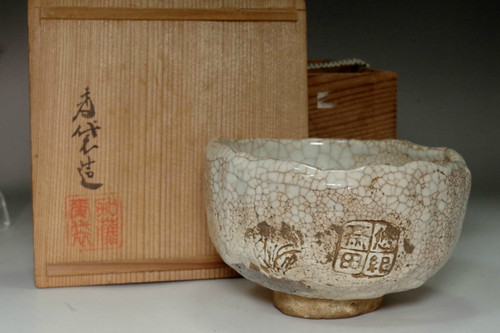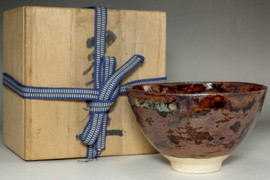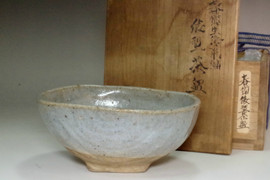Kato Shuntai (1802-1877) Antique tea bowl w/ Yuki-saiden mark #4203
- SKU:
- 4203
- Shipping:
- Free Shipping
- width: approx. 12.8cm (5 3⁄64in) x 11.5cm (4 17⁄32in)
- height: approx. 7.8cm (3 5⁄64in)
- weight: gross 580g
- Yuki-saiden was one of the enthronement ceremonies of Emperor Taishou in 1871. Harvested a rice to make an offering.
Kato Shuntai was a potter from Seto Akatsu village during the end of Tokugawa Shogunate period. Born in a potter family in Seto, the family was one of the three Okamaya families, the Nihei family. His talent blossomed early on and at the age of 15, he succeeded the work of his father, Kagenori (Shunzan), and became a member of Okamaya.
Okamaya is the name of their pottery business. Okamaya was established as a kind of reconstruction policy of the Seto area, which was carried out by the first lord of the Owari clan, Tokugawa Yoshinao. With the influence of potters moving to Mino during the Momoyama period, Seto’s pottery industry, which had been in decline, was called upon to revitalize itself. The Owari clan allowed potters to have a surname and wear a sword (it indicated a sign of identification for officials and related government parties), and provide rice as a salary instead of teaching pottery techniques in Nagoya Castle.
In 1610, Lord Yoshinao summoned Kato Riemon (later renamed Tosaburo), a potter from Seto in Mino, and his younger brother Jinbei to Akatsu Village. The two potters, who responded to the summons, were given the title of “Okamaya” and later, with the addition of potter Tabei from the family, they became “Kato Tosaburo family”, “Kato Jinbei family”, and “Kato Tabei family”. They are called the “three members of Okamaya”.
Yoshinao also summoned Kato Shin’emon, a potter from Seto, and his younger brother San’emon to Shimo-shinano village and ordered them to re-establish the pottery business of the clan.
The Kato Shin’emon and Kato San’emon families were given the title of “On-yakimono-shi,” which was similar to Okamaya. They delivered goods for the clan and worked on the Oniwa-yaki pottery.
Shuntai presented the pottery he made in Akatsu to the clan, and Masatake Takekoshi, the famous retainer of the Owari clan, loved it, as did other Nagoya tea ceramists. Thus, Shuntai’s extraordinary pottery skills instantly made him famous in the pottery world of that time, and he is said to have been a master craftsman. At around the age of 30, he received the name Shuntai from the 11th lord of the Owari clan, Tokugawa Seion.
In addition, through the works and excavations of his generation, it has become clear that Shuntai was engaged in the Ofuke-ware process. While serving the Owari clan, Shuntai also made friends with clan officers Hirasawa Kuro and Ichie Houzo. It is said that Shuntai visited Kuro’s house, and even though he drank heavily every night, Kuro never blamed him, and they enjoyed working together on pottery.
However, he later committed a crime and resigned from Okamaya. There is no record of what the crime was. It seems that Shuntai was a drinker, gambler, and amorous from a young age, and it is thought that this may have led to some problems.
Because Shuntai had moved out of the Okamaya family, the title “Okamaya-Kato Tobei” was taken over by Shuntai’s son, but he died young and eventually his nephew, Umetaro, took over the title and he called himself “Ima-shuntai”.
However, Shuntai’s popularity did not diminish even after he left the Okamaya business. He was asked to make pottery frequently, and he seemed to be wandering around and creating his works. What is clear is that in 1851, at the request of the ninth generation of Imao’s feudal lord, Takekoshi Hogetsu, he built a kiln in Imao and produced pottery. (The ruins of the kiln remain in Kaizu City, Gifu Prefecture.)
Pottery works with a square seal, “Imao Shuntai” were created around this time, and he spent three years in the Imao region, creating tea bowls, drinking bottles, and water jugs in this style. Only a few survive to this day.
In 1866 (Keio 2), Shuntai’s crimes were pardoned and Umetaro left the Okamaya family. Shuntai then returned to the Okamaya family.
He settled down in Akatsu again, and resumed making Ofuke-ware with great enthusiasm.
With the Meiji Restoration and the end of the Shogunate system, Ofuke-ware, which had been under the patronage of the Owari Clan, ceased to be produced. The potters lost their clan’s patronage and salaries. In his later years, Shuntai seemed to wander from place to place, but he fell ill at his fiefdom and he passed away in poverty.

















